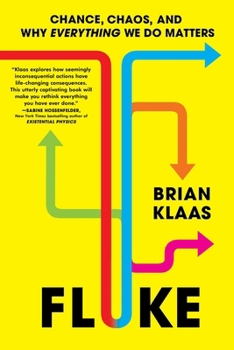Fluke: Chance, Chaos, and Why Everything We Do Matters
Select Format
Select Condition 
Book Overview
In the perspective-altering tradition of Malcolm Gladwell's The Tipping Point and Nassim Nicholas Taleb's The Black Swan comes a provocative challenge to how we think our world works--and why small, chance events can divert our lives and change everything, by social scientist and Atlantic writer Brian Klaas. If you could rewind your life to the very beginning and then press play, would everything turn out the same? Or could making an accidental phone call or missing an exit off the highway change not just your life, but history itself? And would you remain blind to the radically different possible world you unknowingly left behind? In Fluke, myth-shattering social scientist Brian Klaas dives deeply into the phenomenon of random chance and the chaos it can sow, taking aim at most people's neat and tidy storybook version of reality. The book's argument is that we willfully ignore a bewildering truth: but for a few small changes, our lives--and our societies--could be radically different. Offering an entirely new lens, Fluke explores how our world really works, driven by strange interactions and apparently random events. How did one couple's vacation cause 100,000 people to die? Does our decision to hit the snooze button in the morning radically alter the trajectory of our lives? And has the evolution of humans been inevitable, or are we simply the product of a series of freak accidents? Drawing on social science, chaos theory, history, evolutionary biology, and philosophy, Klaas provides a brilliantly fresh look at why things happen--all while providing mind-bending lessons on how we can live smarter, be happier, and lead more fulfilling lives.
Format:Paperback
Language:English
ISBN:1668055848
ISBN13:9781668055847
Release Date:January 2024
Publisher:Scribner Book Company
Length:336 Pages
Weight:0.75 lbs.
Dimensions:0.8" x 6.0" x 9.0"
Customer Reviews
1 rating
Explores Complexity and Non-Linear Systems Applied to Sociology and Life
Published by Bobby Dakota , 1 year ago
As a fan of the Santa Fe Institute and the cutting-edge research of Complexity Science, I found this to be an informative, fun, and provocative read. The author challenges established ways of viewing the world by embracing the unknown, the chaotic, the mysterious. While, in his conclusion, he bends to a more deterministic view of the world, and I bend more to the emergent, his arguments are nevertheless compelling and worth exploring. After I finished reading it, I was inspired to read it again. Lots of food for thought.






